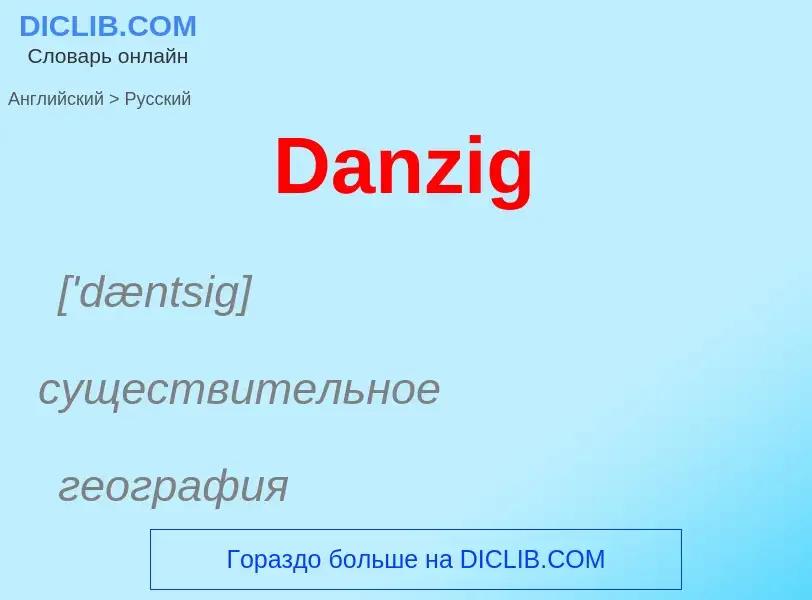Tradução e análise de palavras por inteligência artificial ChatGPT
Nesta página você pode obter uma análise detalhada de uma palavra ou frase, produzida usando a melhor tecnologia de inteligência artificial até o momento:
- como a palavra é usada
- frequência de uso
- é usado com mais frequência na fala oral ou escrita
- opções de tradução de palavras
- exemplos de uso (várias frases com tradução)
- etimologia
Danzig - tradução para russo
['dæntsig]
существительное
география
г. Данциг
[g(ə)'dɑ:nsk]
существительное
география
г. Гданьск
Wikipédia

Gdańsk ( gə-DANSK, US also gə-DAHNSK; Polish: [ɡdaj̃sk] (listen); Kashubian: Gduńsk [ɡduɲsk]; German: Danzig [ˈdantsɪç] (listen); Latin: Gedanum, Dantiscum) is a city on the Baltic coast of northern Poland. With a population of 470,621, Gdańsk is the capital and largest city of the Pomeranian Voivodeship. It is Poland's principal seaport and the country's fourth-largest metropolitan area.
The city lies at the southern edge of Gdańsk Bay, close to the city of Gdynia and resort town of Sopot; these form a metropolitan area called the Tricity (Trójmiasto), with a population of approximately 1.5 million. Gdańsk lies at the mouth of the Motława River, connected to the Leniwka, a branch in the delta of the Vistula River, which connects Gdańsk with the Polish capital Warsaw.
The history of the city has a complex history, having had periods of Polish and German rule, and autonomy as a free city. An important shipbuilding and trade port since the Middle Ages, in 1361 it became a member of the Hanseatic League which influenced its economic, demographic and urban landscape. It also served as Poland's principal seaport, and was the largest city of Poland in the 15th-17th centuries. From 1918 to 1939, Gdańsk lay in the disputed so-called Polish Corridor; its ambiguous political status created tensions that culminated in the German invasion of Poland and the first clash of the Second World War at nearby Westerplatte. In the 1980s, Gdańsk was the birthplace of the Solidarity movement, which helped precipitate the collapse of the Eastern Bloc, the fall of the Berlin Wall and the dissolution of the Warsaw Pact.
Gdańsk is home to the University of Gdańsk, Gdańsk University of Technology, the National Museum, the Gdańsk Shakespeare Theatre, the Museum of the Second World War, the Polish Baltic Philharmonic, the Polish Space Agency and the European Solidarity Centre. Among Gdańsk's most notable historical landmarks are the Town Hall, the Green Gate, Artus Court, Neptune's Fountain, and St. Mary's Church, one of the largest brick churches in the world. The city is served by Gdańsk Lech Wałęsa Airport, the country's third busiest airport and the most important international airport in northern Poland. Companies headquartered in Gdańsk include energy provider Energa SA and clothing retailer LPP.
Gdańsk is among the most visited cities in Poland, received 3.4 million tourists per year according to data collected in 2019. The city also hosts St. Dominic's Fair, which dates back to 1260, and is regarded as one of the biggest trade and cultural events in Europe. Gdańsk has also topped rankings for the quality of life, safety and living standards worldwide, and its historic city center has been listed as one of Poland's national monuments. Nearby sights include Malbork Castle, the Kashubian Lake District, Hel Peninsula and the resort town of Sopot.


![View of Gdańsk's Main Town from the [[Motława]] River (2012) View of Gdańsk's Main Town from the [[Motława]] River (2012)](https://commons.wikimedia.org/wiki/Special:FilePath/2012-08-30 pano gdansk sm2.jpg?width=200)
![''[[Apotheosis]] of Gdańsk'' by Izaak van den Blocke. The [[Vistula]]-borne trade of goods in Poland was the main source of prosperity during the city's Golden Age. ''[[Apotheosis]] of Gdańsk'' by Izaak van den Blocke. The [[Vistula]]-borne trade of goods in Poland was the main source of prosperity during the city's Golden Age.](https://commons.wikimedia.org/wiki/Special:FilePath/Allegory of Gdańsk trade.jpg?width=200)
![Polish defenders of the Polish Post Office]] in Danzig shortly before their trial and execution by the [[Wehrmacht]]. Polish defenders of the Polish Post Office]] in Danzig shortly before their trial and execution by the [[Wehrmacht]].](https://commons.wikimedia.org/wiki/Special:FilePath/Arrested defendants of the Polish Post Office in Gdansk.jpg?width=200)
![St. Mary's Church]] – the largest brick church in the world St. Mary's Church]] – the largest brick church in the world](https://commons.wikimedia.org/wiki/Special:FilePath/Bazylika Mariacka DSC01870.jpg?width=200)
.jpeg?width=200)

.jpg?width=200)
![[[Ergo Arena]] [[Ergo Arena]]](https://commons.wikimedia.org/wiki/Special:FilePath/GdanskSopot ErgoArena 20110603.jpg?width=200)



.jpg?width=200)
![1939 battle]] 1939 battle]]](https://commons.wikimedia.org/wiki/Special:FilePath/Gdańsk (DerHexer) 2010-07-15 091.jpg?width=200)


![[[Polish Baltic Philharmonic]] on the [[Motława]] river [[Polish Baltic Philharmonic]] on the [[Motława]] river](https://commons.wikimedia.org/wiki/Special:FilePath/Hotel Królewski and Filharmonia Bałtycka Gdańsk.jpg?width=200)
 Gyddanyzc Gdańsk Danzig.jpg?width=200)


![[[Museum of the Second World War]], opened in 2017 [[Museum of the Second World War]], opened in 2017](https://commons.wikimedia.org/wiki/Special:FilePath/Museum WWII 2.jpg?width=200)
![Stadion Miejski]] Stadion Miejski]]](https://commons.wikimedia.org/wiki/Special:FilePath/PGE Arena, Gdańsk, 2015-09-25 (Muri WG 2015-34).jpg?width=200)
![Abbot's Palace]] in Oliwa Abbot's Palace]] in Oliwa](https://commons.wikimedia.org/wiki/Special:FilePath/Palacio de Oliwa, Gdansk, Polonia, 2013-05-21, DD 05.jpg?width=200)
![[[Gdańsk Lech Wałęsa Airport]] [[Gdańsk Lech Wałęsa Airport]]](https://commons.wikimedia.org/wiki/Special:FilePath/Port Lotniczy im Lecha Walesy Terminal 2.jpg?width=200)
![PKP Fast Urban Railways]] (SKM) in Gdańsk PKP Fast Urban Railways]] (SKM) in Gdańsk](https://commons.wikimedia.org/wiki/Special:FilePath/SA136-019, Gdańsk Brętowo, 2015-09-25 (Muri WG 2015-34).jpg?width=200)
![[[UEFA Euro 2012]] in Gdańsk [[UEFA Euro 2012]] in Gdańsk](https://commons.wikimedia.org/wiki/Special:FilePath/Spain vs Italy (7381934294).jpg?width=200)
![The [[Gdańsk Shipyard]] strike in 1980 The [[Gdańsk Shipyard]] strike in 1980](https://commons.wikimedia.org/wiki/Special:FilePath/Strajk sierpniowy w Stoczni Gdańskiej im. Lenina 07.jpg?width=200)
![The German battleship [[SMS Schleswig-Holstein]] firing at the Polish Military Transit Depot during the [[battle of Westerplatte]] in September 1939 The German battleship [[SMS Schleswig-Holstein]] firing at the Polish Military Transit Depot during the [[battle of Westerplatte]] in September 1939](https://commons.wikimedia.org/wiki/Special:FilePath/The Nazi-soviet Invasion of Poland, 1939 HU106374.jpg?width=200)
